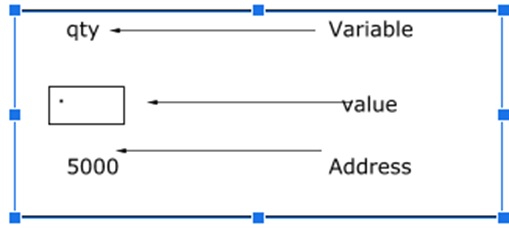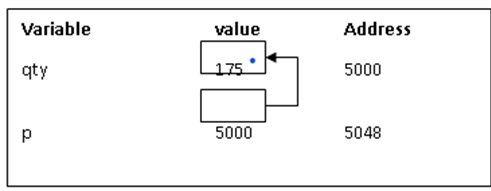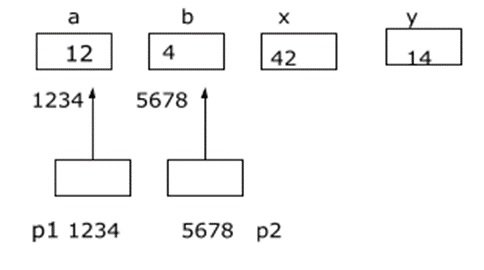
 Data Structure
Data Structure Networking
Networking RDBMS
RDBMS Operating System
Operating System Java
Java MS Excel
MS Excel iOS
iOS HTML
HTML CSS
CSS Android
Android Python
Python C Programming
C Programming C++
C++ C#
C# MongoDB
MongoDB MySQL
MySQL Javascript
Javascript PHP
PHP
- Selected Reading
- UPSC IAS Exams Notes
- Developer's Best Practices
- Questions and Answers
- Effective Resume Writing
- HR Interview Questions
- Computer Glossary
- Who is Who
Explain Arithmetic operations using pointers in C language?
Pointer is a variable which stores the address of other variable.
Pointer declaration, initialization and accessing
Consider the following statement −
int qty = 179;

Declaring a pointer
int *p;
‘p’ is a pointer variable that holds the address of another integer variable.
Initialization of a pointer
Address operator (&) is used to initialize a pointer variable.
int qty = 175; int *p; p= &qty;

Arithmetic operations using pointers
Pointer variables can be used in expressions. For example, if pointer variables are properly declared and initialized then the following statements are valid.
a) *p1 + *p2 b) *p1- *p2 c) *p1 * *p2 d) *p1/ *p2 Note: There must be a blank space between / and * otherwise it is treated as beginning of comment line e ) p1 + 4 f) p2 - 2 g) p1 - p2 Note: returns the no. of elements in between p1 and p2 if both of them point to same array h) p1++ i) – – p2 j) sum + = *p2 j) p1 > p2 k) p1 = = p2 l) p1 ! = p2 Note: Comparisons can be used meaningfully in handling arrays and strings
The following statements are invalid −
a) p1 + p2 b) p1 * p2 c) p1 / p2 d) p1 / 3
Program
#include<stdio.h> main (){ int a,b,x,y,z; int *p1, *p2; a =12; b = 4; p1= &a; p2 = &b; x = *p1 * * p2 – 6; y= 4 - *p2 / *p1+10; printf (“Address of a = %d”, p1); printf (“Address of b = %d”, p2); printf (“a= %d b =%d”, a,b); printf (“x= %d y =%d”, x,y); } Output
Address of a = 1234 Address of b = 5678 a = 12 b= 4 x = 42 y= 14
Explanation


Advertisements
